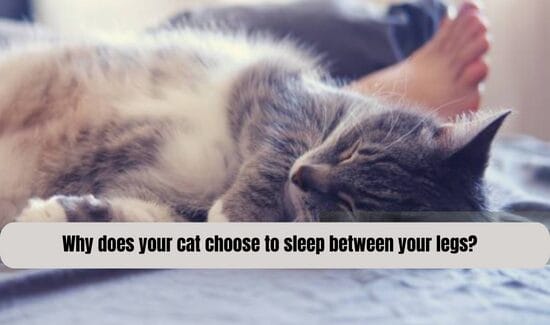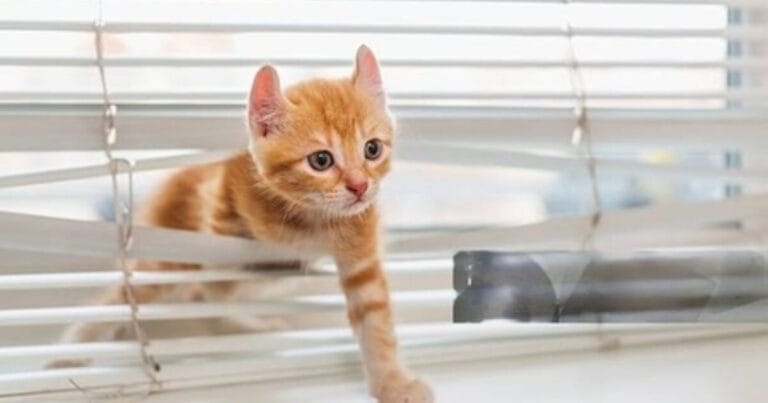When pondering the puzzling question of “why is my cat so dumb,” it is crucial to approach this inquiry with an objective and scientific mindset. As inherently independent creatures, cats possess a unique intelligence that may differ from our own.
However, this could not be further from the truth. Cats are incredibly smart animals with complex cognitive abilities. So why do they sometimes exhibit behaviors that seem “dumb” or “stupid”?
This article will delve into feline intelligence and explore the reasons behind certain cat behaviors that may lead us to believe they are not so bright.
The Unpredictable Nature of Cats:
Before discussing whether cats are dumb, it’s important to understand what intelligence means in the context of felines.
Many people compare cat intelligence to that of dogs, which is unfair since both species have different ways of learning and problem-solving.
While dogs excel at following commands and performing tasks given by humans, cats have evolved to be independent thinkers who rely on their instincts and natural hunting abilities. This does not mean they lack intelligence; they have adapted differently to survive in their environment.
Understanding Cat Intelligence: The Science Behind It:
Cats have long been perceived as aloof and independent creatures, often labeled as “dumb” or” unintelligent.
However, recent scientific studies have shown that cats are quite intelligent and possess complex cognitive abilities.
This section will explore the science behind feline intelligence and debunk the misconception of cats being “dumb.”
1. Brain size and Structure:
One way to measure intelligence is by looking at brain and body sizes. While cats may not have as large brains as other animals, such as primates, their brain-to-body ratio is impressive.
According to a study published in the Proceedings of the National Academy of Sciences, domesticated cats have a brain-to-body ratio similar to wild predators like leopards and tigers.
Additionally, the structure of a cat’s brains also plays a role in their cognitive abilities. Cats have well-developed brains with distinct regions responsible for various functions such as memory, problem-solving, and sensory processing.
2. Problem-Solving Skills:
Contrary to popular belief, cats are highly skilled problem-solvers. One study conducted by researchers from Kyoto University in Japan found that domesticated cats can use their paws to retrieve food from tight spaces – an ability previously thought to be limited only to primates.
Moreover, another study published in Animal Cognition showed that cats possess sophisticated spatial memory skills. This means they can remember where objects are located.
3. Independent Thinkers:
Cats are renowned for their independent nature. Unlike dogs, who often look to their human companions for guidance, cats prefer to do things their way. This can sometimes be misinterpreted as stubbornness or lack of intelligence.
However, it’s important to understand that cats have unique preferences and motivations. They are highly skilled at problem-solving and finding creative solutions to fulfill their needs.
4. Debunking the Myth of Cats Being Dumb:
Cats have long been associated with being aloof, independent, and even dumb. From cartoons to movies, the portrayal of cats as unintelligent animals has become deeply ingrained in our culture—however, this myth couldn’t be different from the truth.
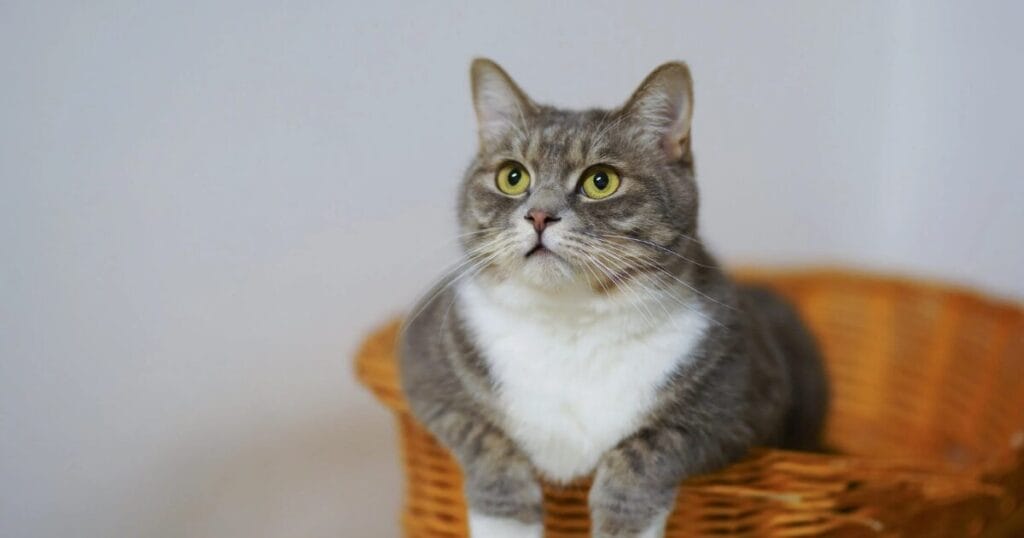
In fact, according to a study conducted by researchers at Kyoto University in Japan, cats possess cognitive abilities that are on par with dogs and even some primates.
So why do we have this misconception about cats being dumb? Let’s discuss some common myths and misconceptions about feline intelligence.
Myth #1: Cats are solitary animals who don’t don’t crave human interaction:
This is a common belief that stems from the idea that cats are independent creatures who can take care of themselves without any help from humans. While it’s true that cats can be more independent than dogs, they still form strong bonds with their owners and crave affection and attention just like any other pet.
Studies have shown that cats develop attachments to their owners similar to those seen in infants towards their caregivers.
Furthermore, domesticated cats have evolved alongside humans for thousands of years and have adapted to living near us. This has led them to develop social behaviors such as meowing to communicate with humans and purring as a sign of contentment. These behaviors require a level of intelligence and understanding on the part of the cat.
Possible Reasons for Perceived Dumb Behavior in Cats:
Sometimes, our beloved feline friends can exhibit behaviors that might seem a bit…dumb. From getting stuck in small spaces to chasing their tail, these actions can leave us scratching our heads and wondering why our cats seem to lack common sense.
However, before jumping to conclusions and labeling your cat as “dumb,” “it’s “must understand that there could be underlying reasons for these perceived behaviors.
1.Instinctual Behaviors:
Cats are natural hunters, and although they may have been domesticated, they still retain their instincts. This means that some of their seemingly “dumb” behaviors could be rooted in their natural hunting instincts.
For example, chasing their tail or pouncing on shadows or moving objects could be a way for them to practice their hunting skills.
2.Curiosity:
Cats are known for being curious creatures, and this curiosity often leads them into trouble (or perceived dumb behavior). They may get stuck in tight spaces because they are simply exploring or trying to find a hiding spot. Their curiosity also extends to playing with household objects such as paper bags or plastic wrappers, which can make them appear silly but are just a form of play for them.
3. Lack of Stimulation:
Just like humans, cats need mental stimulation to stay sharp and focused. If they are not provided with enough toys or activities to keep them engaged, they may resort to seemingly “dumb” habits out of boredom.
4. Nature vs. Nurture:
On one side lies nature—the inherent traits and genetic makeup that shape our fluffy friends from birth. Are some cats predisposed to be less intellectually inclined than others? Could it be a matter of genetics or breed characteristics determining their perceived intelligence?
Then, there are the environmental factors and experiences that mold our furry pals as they navigate life. Can a lack of mental stimulation result in what we perceive as “dumbness”? How does socialization play a role in their cognitive development?
Delving deeper into this discussion unravels fascinating layers about how cats learn, adapt, problem-solve (or don’t), and don’t interact with their natural surroundings and human counterparts.
When pondering why your cat might appear “dumb,” “remember” r to consider both nature and nurture as intertwined forces shaping their individuality.
After all, as humans vary greatly in intellectual prowess despite similar growth opportunities, our feline friends are no different—each possessing unique combinations of genetic predispositions and personal histories.
Coping with “Dumb” Cat Behaviour: Solutions:
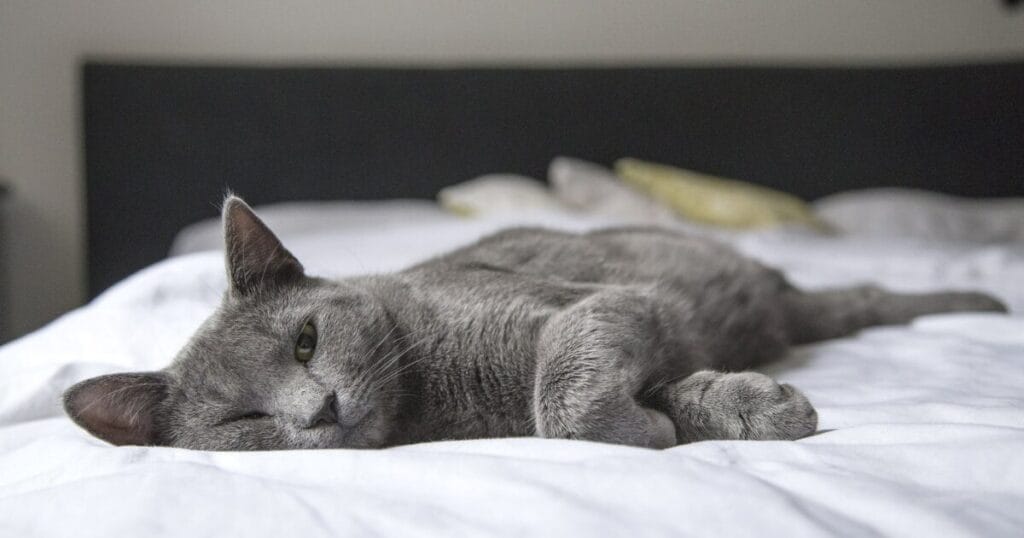
1. Knocking Over Your Stuff:
Cats often knock over objects out of curiosity or playfulness, which can be frustrating.
To address this behavior:
- Secure Items: Place fragile or valuable items out of reach or use adhesive putty to secure them to surfaces.
- Offer Alternatives: Provide your cat with toys and activities that mimic the sensation of knocking things over, such as toys with movable parts.
- Supervised Play: Spend quality time playing with your cat to help them burn off excess energy.
2. Urinating Outside the Litter Box:
Urinating outside the litter box is a common issue that can be misunderstood as “dumb”.
To address this problem:
- Consult a Vet: Rule out any medical issues by consulting your veterinarian. Urinating outside the litter box can indicate an underlying health problem.
- Maintain a Clean Litter Box: Ensure the litter box is clean and in a quiet, accessible location.
- Address Stress: Identify and address any stressors in your cat’s enactment that may be causing the behavior.
3. Biting/Scratching Your Hands and Feet:
Cats may nibble or scratch your hands and feet during play, which can be misinterpreted as aggressive or “dumb” behaviour.
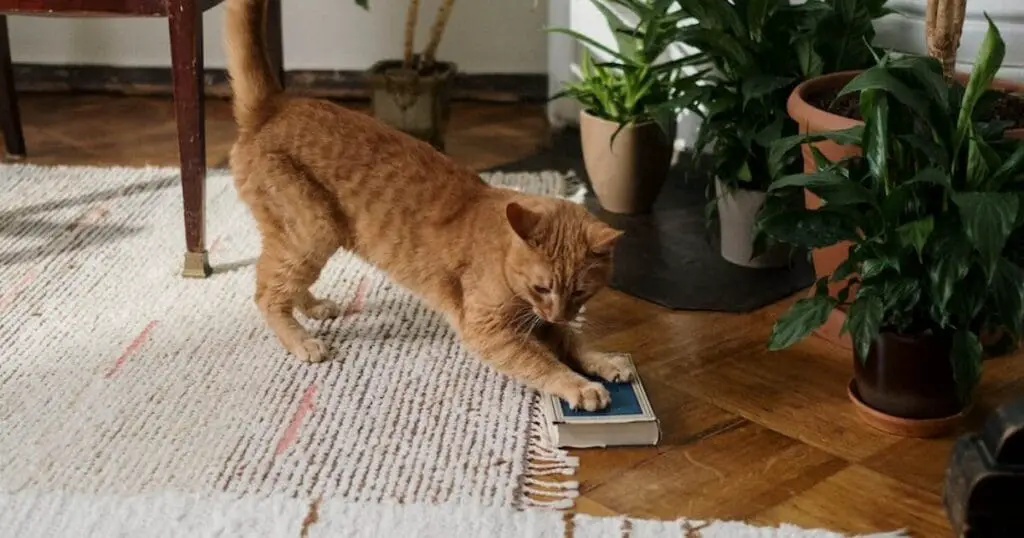
To manage this:
- Gentle Correction: Stop the interaction immediately if your cat’s plats come too rough. Use a soft, consistent correction to discourage this behavior.
- Provide Toys: Ensure your cat has appropriate toys to engage with, such as soft toys or catnip-filled items, to redirect their playful energy.
- Avoid Punishment: Never punish your cat physically or verbally, as it can lead to fear and anxiety.
The Role of Breed and Genetics in Cat Intelligence:
The intelligence of cats has always been a topic of interest and debate among cat owners. Some feline companions possess impressive problem-solving skills and exhibit high levels of intelligence, while others may not be as quick-witted or curious. Many factors can influence a cat’s intelligence, including breed and genetics.
1.Breed in Cat Intelligence:
Breed plays a significant role in determining a cat’s incat’sgence. Certain breeds, such as Siamese, Abyssinian, and Sphynx, are known for their high levels of intelligence. These cats have been selectively bred for centuries to enhance their cognitive abilities and problem-solving skills.
On the other hand, some breeds, like Persian cats, may need to rank more highly regarding intelligence due to their laid-back nature and preference for lounging rather than exploring.
2.Genetics in Cat Intelligence:
Genetics also plays a crucial role in a cat’s evolution. Just like humans inherit certain traits from their parents, cats also inherit genes that affect their brain development and cognitive function.
A study conducted by the University of Edinburgh found that there is a genetic component to feline intelligence. They discovered that several genes related to brain development were associated with higher levels of cognition in cats.
One specific gene called CMAH has been linked to higher social ability and memory levels in domesticated animals like dogs but is absent in domesticated cats due to evolution. This could explain why dogs tend to be more trainable than cats.
Environmental Factors and their Impact on a Cats:
Environmental factors play a significant role in shaping a cat’s intelligence. While genetics may determine the basic level of cognitive abilities, the environment can greatly influence how those abilities develop and are expressed in everyday life.
1.Early Life Experiences:
One of the most important environmental factors that affect a cat’s intelligence is their early life experiences.
Kittens raised in stimulating and interactive environments tend to have better cognitive skills than those not exposed to such environments. This is because kittens learn by observing and interacting with their surroundings. They will develop stronger problem-solving skills, memory, and social understanding if provided with plenty of opportunities for exploration and play.
2. Stressful Environments:
On the other hand, kittens who grow up in unstimulating or stressful environments may struggle to reach their full cognitive potential. This could be due to limited exposure to new stimuli or inadequate socialization during their critical development period.
Additionally, chronic stress can negatively impact brain development and function, leading to learning difficulties and behavioral problems later on.
3. Living Conditions Of Outdoor Cats And Indoor Cats:
Another major environmental factor influencing a cat’s incongestion is their living conditions. Cats who live exclusively indoors tend to have lower mental stimulation levels than outdoor cats.
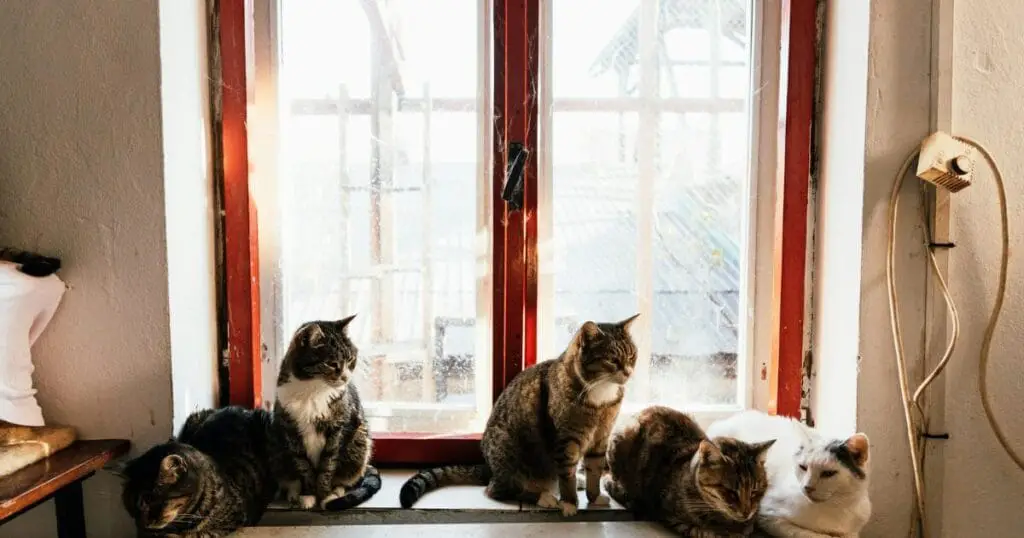
Outdoor cats have access to different sights, sounds, smells, and daily challenges that indoor cats do not encounter. These experiences help stimulate their minds and keep them mentally sharp.
Indoor cats can also suffer from boredom if they lack opportunities for mental engagement. Without adequate stimulation through toys or games with their owners, they may become lethargic or engage in destructive behaviors.
Training for Improving Your Cat’s Mental Stimulation:
Cats are known for intelligence and independence, but sometimes they appear “dumb” or” uninterested” in their surroundings. This could be due to a lack of mental stimulation in their daily routine.
Like humans, cats also need mental exercise to keep their minds sharp and healthy.
This section will discuss tips for improving your cat’s stimulation and helping them reach their full potential.
1.Interactive Toys:
Interactive toys are a great way to engage your cat that require your cat to use problem-solving skills and strategize to get the treat or toy hidden inside.
- Puzzle feeders, treat dispensing balls, and interactive laser pointers are all excellent options for stimulating your cat’s micat’sreate an Enriched Environment:
A boring environment can lead to a bored and disinterested cat. To prevent this, try creating an enriched environment for your furry friend by adding perches, scratching posts, hiding spots, and toys throughout the house. This will give your cat plenty of opportunities to explore and play while keeping them mentally engaged.
2.Teach New Tricks:
Contrary to popular belief, cats can be trained just like dogs! Teaching your cat new tricks provides mental stimulation and strengthens the bond between you.
Start with simple commands such as “sit” or “hi, “h-fi,” e,” and then g, “and gradually move on to more challenging tasks like fetching or jumping through hoops.
3. Regular Playtime:
Regular playtime is like a secret recipe that can transform the supposedly “dumb” behavior of our feline friends.
To understand why your cat might sometimes appear less than brilliant, it’s important to step into their paws for a moment.
Imagine spending most of your day indoors, confined within four walls. Even for humans, this lack of mental and physical stimulation could lead to boredom and dulled senses.
Regular play sessions unlock a world of possibilities for our cats’ debasement. The mere act of chasing feathers or batting around toy mice activates their instincts – honing their agility and reflexes while providing essential exercise, too!
Moreover, these interactions offer crucial cognitive challenges; think about how they strategize to capture that elusive red dot! But remember the bond we share with our fluffy companions during playtime.
These moments create trust and awaken an unspoken language that deepens connection. While some may label cats as “dumb” or “regular,” playtime allows them to showcase their hidden genius potential.
When to Seek Professional Help for Behavioral Issues:
If you have noticed that your cat is exhibiting unusual or concerning behaviors, it may be time to seek professional help. While cats are known for having quirky personalities, certain behavioral issues can indicate a more serious problem.
1.Persistent Aggression:
One of the most common reasons why owners seek professional help for their cats is due to aggression. While an occasional hiss or scratch may not be cause for concern, persistent and unprovoked aggression towards people or other pets could be a sign of an underlying issue. This could include medical conditions, fear or anxiety, past trauma, or improper socialization.
A professional behaviorist will be able to assess the situation and provide guidance on addressing and managing your cat’s aggression.
2. Excessive Vocalization:
Cats are known for their meowing and purring, but if your feline friend won’t stop notowing or is making unusual sounds like yowling or growling, it could be a sign of a behavioral issue.
Some cats may vocalize excessively due to stress, boredom, separation anxiety, or age-related cognitive decline. A professional can help determine the root cause of your cat’s excessive vocalization and provide strategies to manage it.
3. Litter Box Issues:
Another reason why many owners seek professional help is litter box problems. Sometimes, our feline friends can act in bewildering ways, leading us to question their intelligence. One common issue is their improper use of the litter box. However, attributing this to “dumbness” is an understanding of cat behavior.
As instinctual and territorial animals, cats often exhibit such behaviors due to environmental changes, medical problems, or stress. Understanding these underlying causes can help us address the problem effectively and maintain a harmonious relationship with our cats.
For instance, if a cat suddenly stops using its litter box, it may react to a change in the environment. This could be a new piece of furniture, a new pet, or even a new smell.
Cats are highly sensitive to their surroundings; any alteration can throw them off balance. Similarly, medical issues like urinary tract infections or kidney problems can cause a cat to avoid the litter box due to associated pain. It’s crucial to rule out such health concerns with a visit to the vet. Finally, stress can also lead to litter box issues.
Cats are creatures of habit, disrupting their routine can lead to anxiety. This might be reflected in their litter box habits. To address this, ensure your cat’s enactment is stable, secure, and free from unexpected disturbances.
Conclusion: Appreciating Our Feline Friends:
Next time you wonder, “Why is “your cat so dumb?” take a “moment to reconsider. Cats are intelligent creatures with unique ways of perceiving and interacting with the world. While sometimes perplexing, their behaviors result from their instincts, independent nature, and individual personalities.
Understanding and appreciating feline behavior can foster a deeper connection with your furry companion and truly celebrate their remarkable intelligence.
Firstly, let us consider their instincts and behaviors. Cats are known for their incredible hunting skills, which require high agility, patience, and quick thinking. They also have excellent reflexes and coordination, making them skilled predators in the wild. These traits may seem simple, but they showcase an innate intelligence honed through centuries of evolution.
Moreover, cats have a strong sense of independence and self-sufficiency. Unlike dogs, who rely heavily on human interaction for survival, cats can fend for themselves if needed.
They know how to find food and shelter and protect themselves from danger without any formal training or guidance from humans. This self-sufficiency is a sign of intelligence and adaptability.
So, the next time your cat does something that seems less than brilliant, remember there’s a method to their madness. Embrace their uniqueness, shower them with love, and enjoy the delightful company of your not-so-dumb feline friend.


